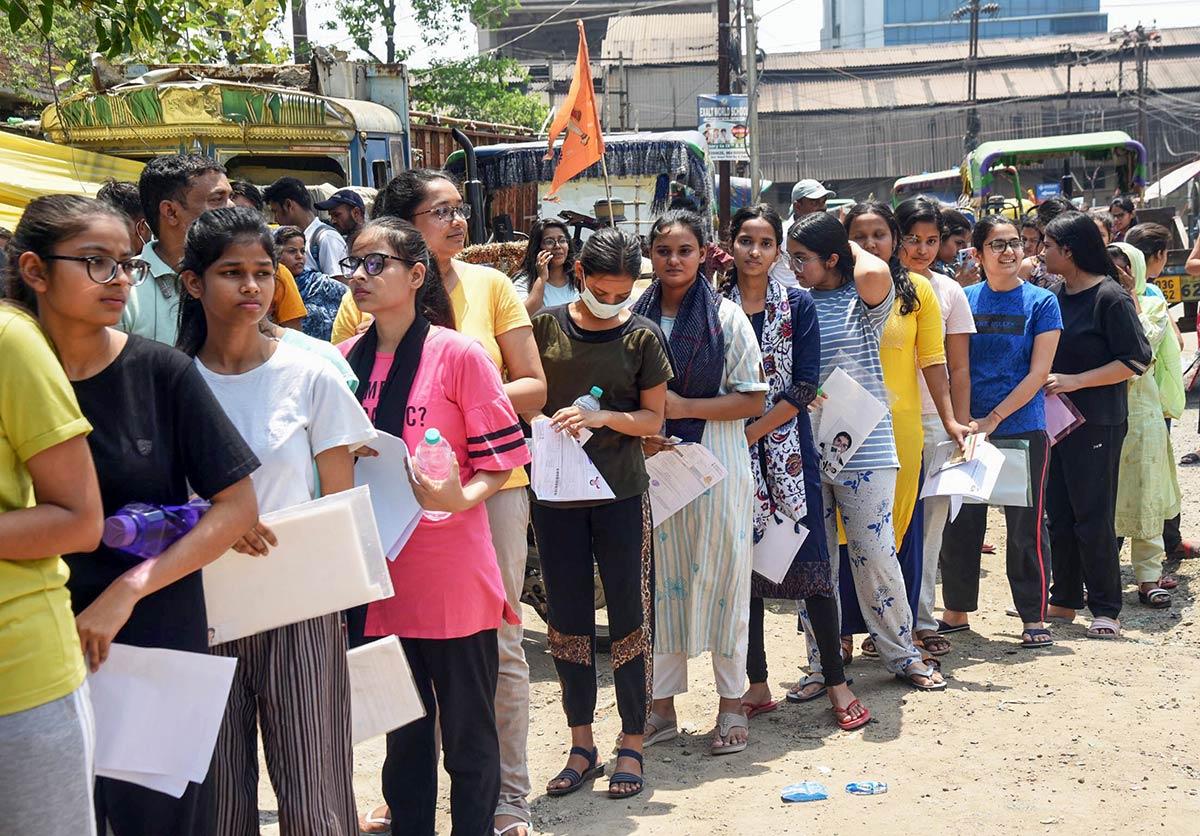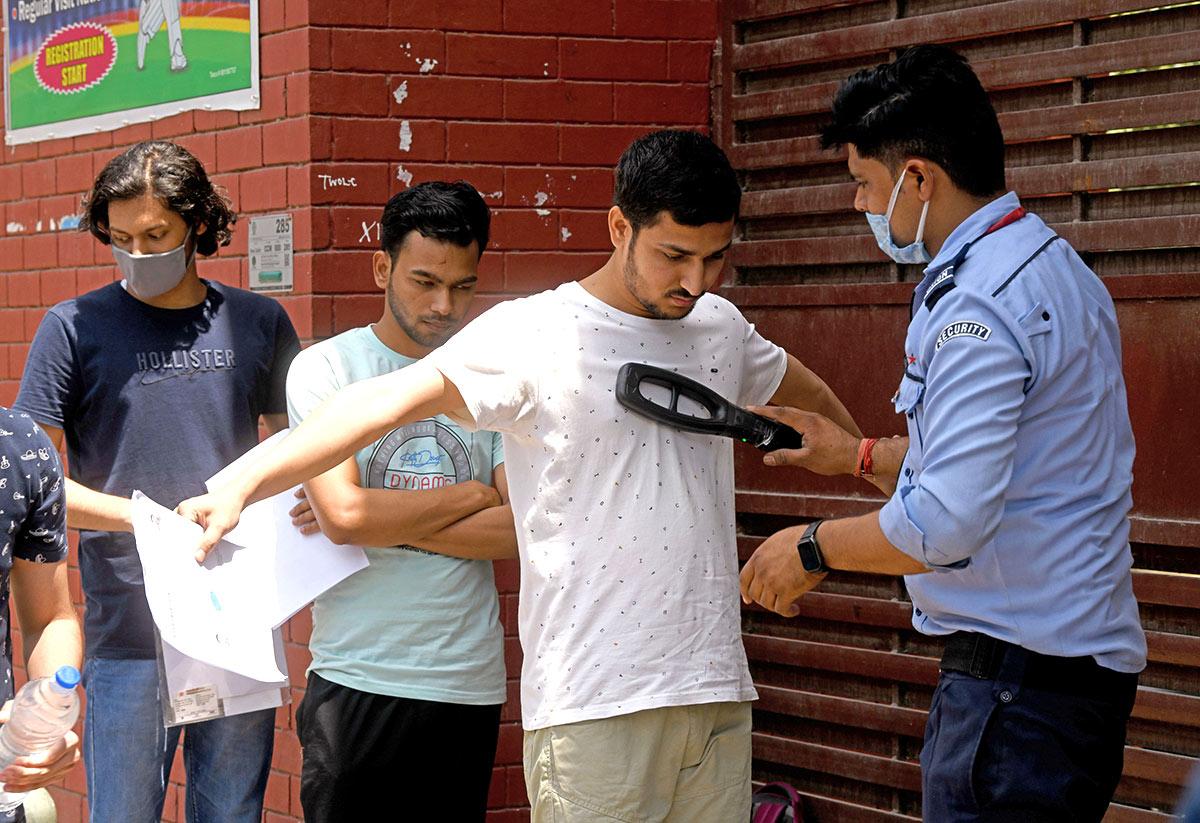Beyond a point, competition is boring. The fun is in the doing, irrespective of outcome.
By the time I was in college, I knew I valued awareness more than success, notes Shyam G Menon.

Amidst the ongoing controversy about the National Eligibility cum Entrance Test (NEET) and the several instances of students unable to bear the pressure of coaching classes, committing suicide, snapshots from life gone by, came to mind.
Relieved to get an opportunity to escape mathematics and science, after completing my tenth standard, I had embraced the arts.
Those years in Kerala, eleventh and twelfth fell under the pre-degree programme.
Top scorers in the tenth exams went for the much sought after first and second groups, which featured mathematics and science; the former paved the way for a prospective career in engineering while the latter led to medicine.
Those just below these top scorers opted for the fourth group, which offered studies in commerce.
The rest, with a small sprinkling of well-scoring oddballs consciously preferring the arts, opted for the third group and studied history, economics and such.

A close friend from school, whose mother was a doctor, had elected to be in the second group and try for medicine.
Pre-degree done in the third group (I liked the subjects I studied and so did well), I enrolled for a degree in economics. It was the logical thing to do as far as I was concerned.
My friend failed to get through the medical entrance test on his first attempt. I remember, he was fairly cool about it, even sporting a degree of self-acceptance.
He decided to apply for economics. I was around when he presented his plan to his mother. She was alarmed. "Is there any future in a subject like economics?" she asked, little realising that I, who had enrolled for a degree in economics, was standing nearby.
I always remember this instance as a case of genuineparental concern and how deeply the idea of successful survival is embedded in an Indian plan for higher education.
As we know, in India, an education in the STEM subjects (science, technology, engineering, mathematics) not only holds promise for a job, it also promises better chances to go abroad, make money, find a life-partner and become well-settled.
Which parent wouldn't wish this for a child? And let's be honest -- which child wouldn't want it too?

In the Indian context, it is an exceptional parent who allows his/her child to pursue what he/she wants, overlooking the social and financial prospects resident in the choice.
My friend succumbed to his mother's worry, registered for private coaching in the sciences, took the entrance test again, cleared it with good scores and gained admission to do his studies in medicine.
We saw each other intermittently over the next couple of years. Then I left Kerala and moved to Delhi. I never saw my friend again. I understand he is doing good work abroad, as a doctor.
My humble BA (Economics) classroom at college, received periodic visits from another friend, also a would-be doctor, trading his pursuit of the sciences for the less axiomatic and more explorative world of the arts.
A good debater, his curiosity for the world couldn't be restricted to the academic requirements of entrance tests.
After a year of such occasional dive-ins into my classroom for a taste of humanities, he left to study medicine and went on to become one of the most successful hospital administrators India produced.
Each time, I come across yet another instance of the iron grip wielded by STEM subjects on Indian education, I remember my two friends and their brush with the arts.
As for me, free of disciplinarian school-teachers expecting a mathematics genius or a doctor or engineer from every student, I continued my engagement with the sciences reading whatever popular books on the subject I could find.
Mathematics is still another planet for me; in that sense, I am an oddly wired Indian. I warmed up to mathematics only on two occasions.
The first was during my school years, when my cousin (a future IIT graduate) pitched in to teach me math for a scholarship exam. He helped me understand the subject. I scored well in the test and got the scholarship.
The second was many years later, when as a smalltime rock climber in Mumbai, I read about John Gill, the American mathematician who is considered the father of bouldering.
As in mathematics, in climbing too, a sequence of difficult moves completing a climb, is called a problem. Incidentally, most of my friends in climbing had a STEM background.
My closest friend in climbing was once a research student in mathematics. Days on rock became days of marveling at existence; he, by highlighting the underlying math to it all.

Did I get anything by learning humanities? I typically answer that by trying to answer another question.
If STEM is so core to human advancement, how come the planet finds itself so compromised and subjected to issues like altered weather systems and wars with no end -- most of that with only human imagination and activity to blame?
Within the human vertical, why do we find ourselves tackling more authoritarian governments and polarized political viewpoints, each of these view points catering to distinctly insular interests and thus very unlike the idea of education, which is to broaden a person's outlook?
Like weather systems rendered irregular through excess emphasis on certain types of human activity, I suspect the human mind has become overwhelmingly partial to certain subjects at the expense of awareness by others, resulting in a partially parched imagination.
I have nothing against STEM. But the question is -- have we damaged ourselves by ignoring the importance of other subjects?
After all, what we call human and humane are the composite of many talents we are capable of and not merely a handful.
Second, there is a huge difference between what STEM is and what STEM does.
In our rat race-ridden contemporary world, the latter has become more important for us than the former. Consequently, the rewards of a STEM education -- monetary and social -- far outweigh what the subjects themselves stand for.
So much so that the real benefit of so many people studying STEM subjects has been arguably denied to society because the emphasis was never on the subjects or what they are meant to do.
Climate change is a reality despite our engineers and healthcare is expensive despite our doctors.
Finally, in the Indian system of education, the student is easily faulted. But never, the teacher.
Forget the coaching centres of Kota, Pala and other towns, which train students to pass exams. How good are our teachers in actually instilling an affection for the subject in students, such that it outlives other compulsions and temptations faced by the human being?
Unfortunately, in our country and its social set-up, nursing a passion for something, is rarely a sustainable proposition.
We major in subjects and then often go on to become professionals sporting a conduct that would shame the subjects we learnt and the education we got.

So, to answer the question about what I got by learning humanities -- all I can submit is that in my life, I hopefully didn't err on the side, most people usually err on.
I have more questions than answers and I am happy I have those questions to remind me that humankind isn't perfect.
There is another thing I have noticed; a rather strange angle. Aside from meeting old friends occasionally, I never attended any of my school or college alumni get-togethers.
Between the two, I find it hard to attend school reunions because I associate my introduction to competition with school level education and the bulk of latter-day introductions thereafter, still revolve around how successful and well-settled my classmates are.
It's as if the class hasn't stopped racing. Beyond a point, competition is boring. The fun is in the doing, irrespective of outcome.
College, I find, is a bit more forgiving because like my drift to humanities, life's first sieving in terms of what one likes and one doesn't, had already happened.
By the time I was in college, I knew I valued awareness more than success.
Awareness is like sitting on the beach; on the edge of an ocean holding many secrets.
Notwithstanding the fact that three of us never wrote any STEM-ridden entrance test, four men in their fifties still meet periodically in Thiruvananthapuram -- sometimes at the beach at Kovalam -- for a chat on times gone by and times yet to come.
A hospital administrator, an advertising and marketing professional and two journalists. A cup of tea in some quiet place and a lot of latitude to forgive and accept. Life feels neat.
Shyam G Menon is a freelance journalist based in Mumbai.
Feature Presentation: Ashish Narsale/Rediff.com






 © 2025
© 2025